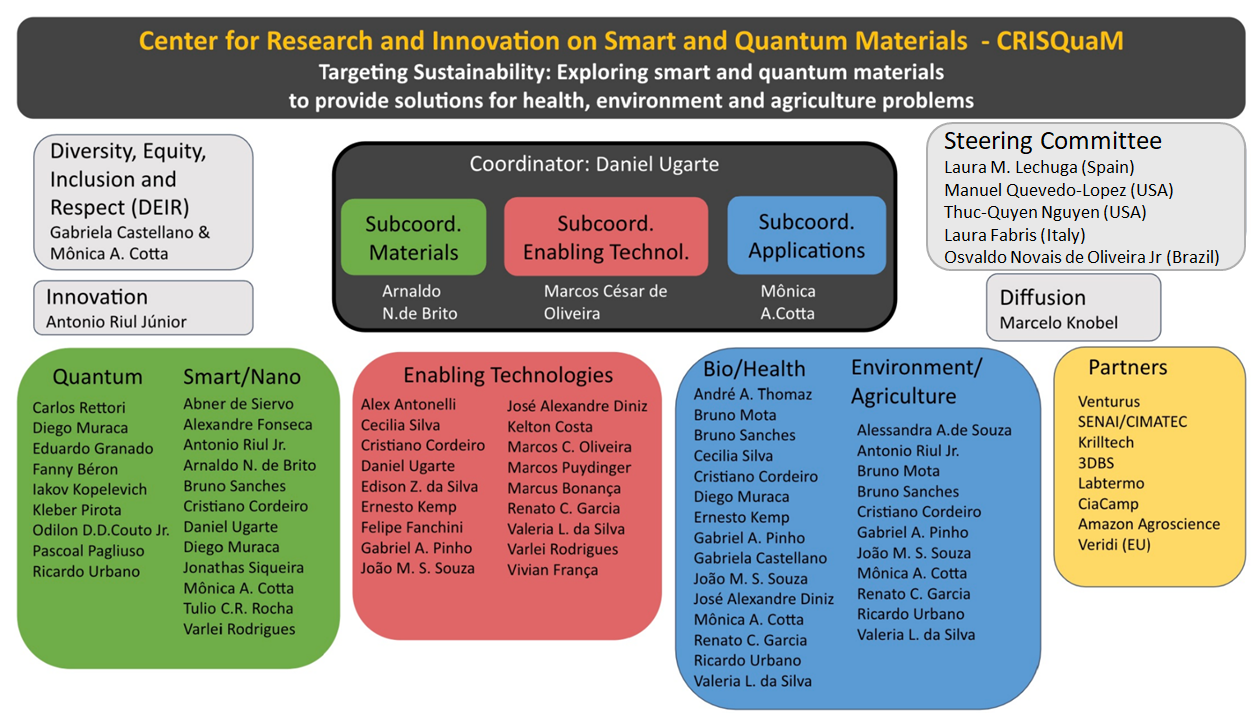BV-FAPESP: research projects supported in this Center
CRISQuaM in the Media: news about the center
CRISQuaM aims to explore the synergistic development of fundamental and applied science to create new materials with high potential for the construction of devices and sensors to address technological challenges related to sustainability, climate change, precision agriculture, ecology, and health. To achieve these goals, we have assembled an interdisciplinary and collaborative research team, integrating expertise across various scientific domains, researching novel materials with high innovation potential. By combining original synthesis methods, advanced characterization techniques, theoretical approaches, computational simulations, quantum technologies, and device construction designs, we aim to drive advances in smart and quantum materials, promoting scientific excellence and technological development. With this, we plan disruptive innovations in instrumentation—including hardware and AI-based tools—as well as in quantum technologies, biomedical devices, and signal processing, in addition to plant bionics, exploring plant-pathogen interactions. Besides research activities, we plan intensive actions in education, dissemination, and communication for the general public, as a modern society should be aware of the challenges humanity faces and how research and technology are essential for responsibly utilizing the planet's limited resources. CRISQuaM's Innovation activities are accelerated through partnerships with several companies in related technologies, many of them Brazilian. Finally, all activities of the Center are managed in accordance with diversity, equity, and inclusion goals and best practices.
The Center brings together scientists, engineers, and innovators in a collaborative effort to apply materials science and quantum technologies at the cutting edge, designing new materials and nano(bio)sensors for advanced diagnostics. The Center has a team capable of producing a wide range of (nano/micro) materials, along with precise chemical and physical characterizations using modern techniques (synchrotron, advanced microscopy, magnetotransport, magnetic resonance, optics, etc.). In addition, the team offers various options in enabling technologies, including miniaturization, processing, and additive manufacturing, as well as instrumentation, quantum sensing, and electronics development. Data analysis will employ updated approaches (numerical simulation, classical and quantum machine learning, and quantum optimization). Applications at the knowledge frontier will address urgent sustainability needs in environmental areas, precision agriculture, plant bionics, and biomedical interfaces, contributing to the development of local technologies in close partnership with the Brazilian industry.
The organization of the Center is based on three pillars — Materials, Enabling Technologies, and Applications — together with partner companies, as described in the figure below.

2023-08-23
In a study involving 46 volunteers, researchers at the Federal University of São Paulo found that telomere shortening, a biomarker of cellular aging, accelerated in untreated obstructive sleep apnea patients, whereas continuous positive airway pressure attenuated the damage.
2023-08-23
Based on artificial intelligence techniques such as neural networks and machine learning, the system takes seconds to perform tasks that used to take months. It will extract useful information from the gigantic amount of data furnished by the new Vera C. Rubin telescope.
2023-08-23
Experiments with rats at the Federal University of São Paulo suggest that the technique promotes reprogramming of the neurons affected by the disease, making them return to a normal state and interrupting seizures. Increased production of adenosine appears to play a key role in the process.
2023-08-23
The project is the result of a partnership between FAPESP and Shell and could help make hydrogen a widely used fuel in Brazil. Hydrogen from a pilot plant to be built at USP using Raízen’s ethanol will power buses on the campus.
2023-08-16
A collaborative study by Brazilian and British researchers shows for the first time that obesity can cause a lack of vitamin D and not the other way around. The risk of vitamin D insufficiency and deficiency in subjects with abdominal obesity was 36% and 64% higher respectively than in those without.
2023-08-16
A biocatalyst discovered by Brazilian researchers has the potential to increase renewable biofuel output by removing obstacles in technology and production processes, as well as enhancing the manufacturing of bioplastics and biopolymers.
2023-08-16
Researchers used magnetic resonance imaging to train a machine learning algorithm to help diagnose autism. The study involved physicists, statisticians, physicians and neuroscientists from centers in Brazil, France and Germany.
2023-08-16
A project conducted by the Brazilian Agricultural Research Corporation (EMBRAPA) cross-referenced data from sensors to analyze soil and weather variations in the same vineyard so as to produce different wines and improve water and fertilizer management. Wineries in São Paulo state are already benefiting from the results.